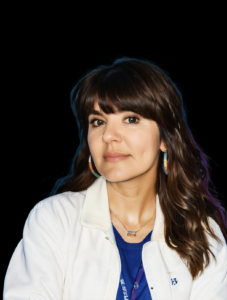
Name: Melinda Soares-Furtado
Title, including department and school you work in: Assistant Professor, Departments of Astronomy and Physics, College of Letters & Science. RADIAL Site Director
Hometown: Gilroy, California
Educational/professional background: BS in physics from UCSC, Masters in Astrophysical Science from Princeton, PhD in Astrophysical Science from Princeton. I’m trained in computational and observational astrophysics.
What is your field of research, and how did you get into it? Stellar and exoplanetary astrophysics. My field of research centers on stars and the diverse worlds that orbit them, focusing on how planetary systems form and evolve. I was fortunate to begin research early in my academic journey at UC Santa Cruz, where I had hands-on experiences that fueled my passion. Later, I joined a graduate program at Princeton that emphasized research rotations, allowing me to explore various topics and discover where my true interests lay. This exposure to different fields ultimately led me to the study of stars and exoplanets, where there’s always something new and mysterious to uncover.
What attracted you to UW-Madison? I was drawn to UW–Madison for its exceptional research environment and the unique opportunities for collaboration across disciplines. The Department of Astronomy is impressively broad in scope, with strengths across stellar astrophysics, cosmology, and planetary science, and it fosters a collegial atmosphere that supports teamwork and shared exploration. Access to state-of-the-art facilities, like WIYN/NEID, SALT, and NOEMA, provides unparalleled opportunities for high-impact research and discovery. Beyond the academic and research strengths, I love living in the Midwest, and Madison’s welcoming community and high quality of life make it an ideal place to raise a family, combining professional growth with a wonderful place to call home.
What was your first visit to campus like? My first visit to UW–Madison left a lasting impression. The people I met were warm, welcoming, and genuinely enthusiastic about their work and the community here, which made all the difference. I knew I wanted to come back someday and be part of such an inspiring and supportive environment.
What’s the most important lesson you wish to convey to students? More than anything I’d like to convey the value of being kind to yourself and others. It sounds trite, but kindness goes a long way and is often in short supply. In the same vein, I’d like to convey the value of some risk — be willing to try hard things. Be willing to fail at those things, to incorporate feedback, and to try again. Putting on my STEM teacher hat, I think there is immense value in the ways in which STEM classes can help you become a better critical thinker and problem solver.
Does your work relate in any way to the Wisconsin Idea? If so, please describe how. I am deeply committed to public service, community building, and forging partnerships that extend beyond the UW–Madison campus. Over the years, I’ve collaborated with educators at the Milwaukee Public Museum, the UW Space Place, and the Wisconsin Space Grant Consortium, working to create impactful learning experiences and expand access to science education. I genuinely enjoy connecting with people across the community, learning from one another, and finding new ways to grow and inspire together. For me, this work is about building lasting relationships that empower individuals and strengthen our shared mission of advancing knowledge and curiosity.
What’s something interesting about your area of expertise you can share that will make us sound smarter at parties? While moons outnumber solar system bodies by more than a factor of 100:1, we have yet to confirm the detection of an exomoon. The Nancy Grace Roman Space Telescope, to be launched in spring 2027, will change that. Moons are more than just planetary appendages, there are currently some of the most compelling places to search for life beyond Earth. I could go on and on about missions to the gas giant moons in our Solar System. In fact, I’m teaching a class that covers much of that material right now!
Hobbies/other interests: I like to garden, read, and spend time with my family. I often hike the Grady Tract Loop not far from my home. I have an app I use to identify plants, fungi, and wildlife. My daughter and I like to use it when we go on walks together. I have a fondness for photography. During my undergraduate years, I worked with my sister as a family photographer in California. These days I mostly photograph plants and landscapes. I also love to dance cumbia, salsa, and bachata. I danced often when I was growing up and even spent some time on a salsa choreography team in San Jose, California. I also collect and read vintage textbooks — most of my favorites are from the 1930s.